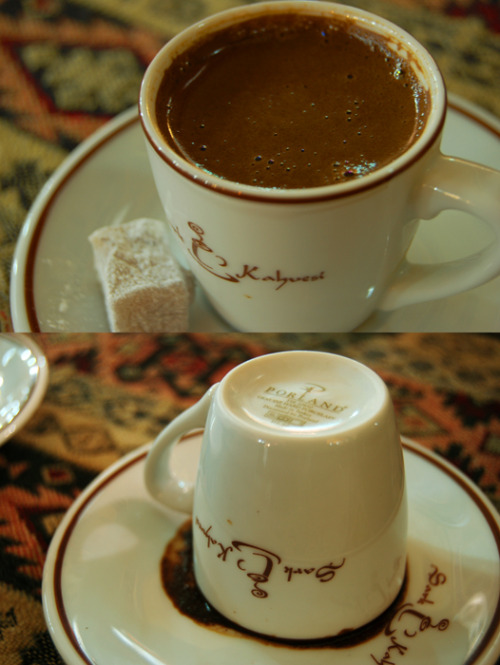 |
| Who wants to look at this stuff all wet and smooshy at the bottom of a cup? |
Tea leaves are not easy to read. Trelawney should have started with something basic. Tea leaves are not basic.
I can (but don't, so please, don't ask!) read pretty much anything: cards, palms, fire, moles, dreams, handwriting, wax...I used to love it, until I started worrying about my soul. Tea leaves - not so much. I think it's because they're soggy. I hate soggy things. I love tea, but staring at the sodden leaves at the bottom of my cup is completely unattractive. Soggy things are gross. So I was all in sympathy with Harry & Co. when they have to start their Divination journey reading tea leaves. Ugh. My inner-eye drowns just thinking about it.
* * * * * * * *
 |
| coffee-reading..I'd almost be willing to try! |
Trelawney is a delightful fraud though. I love watching her work! I remember once coming across a book of divination almost completely focused on 'faking it' (because sometimes you're having a Hermione sort of day).. I wonder if Rowling has seen the same book. Trelawney hits every point - I can't help but be impressed with her presentation. All the same.. I can see the 'truth' in Harry's cup..he does have an enemy, he will be attacked, and if you avoid to horrifically dramatic death-omen, well..the whole 'dog' image is...[Spoiler]..you know..applicable. Death omens are not a good choice - unless you're not really interested in accuracy. Because death images in Divination rarely relate to actual death. All the same..I'd love to get my hands on a book like What to do When You Know the Worst is Coming.. sensational and fear-inducing as I'm sure it is. (Thanks for bring that book up, Christie!) I kind of love that Trelawney probably knows this, but can't help going for effect over any sort of reliability or educational effectiveness. She's much more interested in putting on a show than in actually informing her students - it's the sort of teacher I'd probably be..which is fun to imagine.
Her showiness is a good reason to start with tea leaves..since most of her students are pretty much guaranteed to see nothing more that clumps of soggy leaves..but the cups and saucers give her props to wave about, the steam and hot tea aid in relaxation..and who knows what's actually in the tea!!
* * * * * * * *
Overall, Rowling's treatment is so very affectionate. Hermione is the harshest critic of the art, and she's obviously lacking a sense of humor - due perhaps to her overloaded schedule and her obvious need to succeed at everything..poor Hermione, if she could just learn divination, maybe she'd be able to look ahead at her tests and comfort herself a bit. She needs comforting..or at least a couple beers (oh, wait, she's 13..just one then!). It's nice to know the flakes of the world (Trelawney, Lavender, Parvati) show up alongside the Type - A, rationalists in the wizarding world as well as the real world. And really, there's no better place to reveal them than in the Divination tower.. Flakes of all types love divination - until you tell them the cute-guy-from-Whole-Foods won't actually be marrying them in the next few months - and Hermione or McGonagall types loathe it..even when it's dead on. Jenna mentions that in this first class there is "a clear refutation of the idea that there's anything in the standard charlatanry primarily associated with ..fortune-telling" but reminds us that "we're not through with Divination yet." ..Not through yet...a fun thought to hold on to against the lurking Dementors and the haunting 'Grim'.
So..What do you think of Rowling's introduction to divination? Fair, fun, likely to lead teens toward the tarot-card section of Barnes & Noble?
 |
| found on pinterest & love it |


































